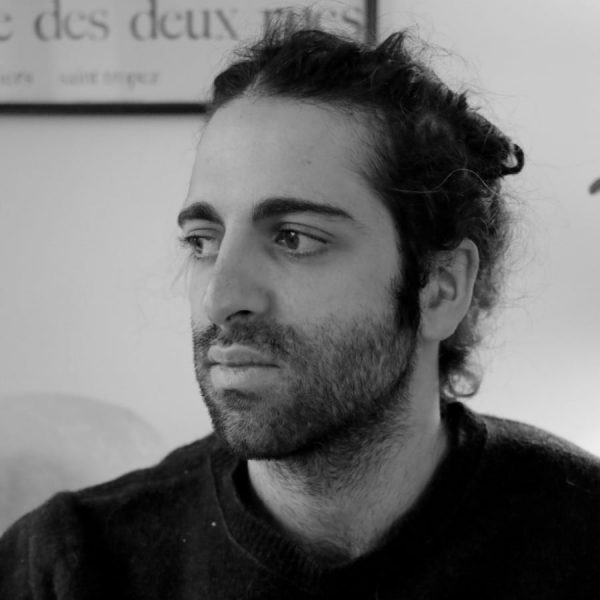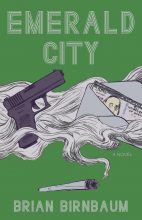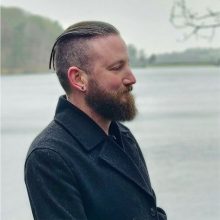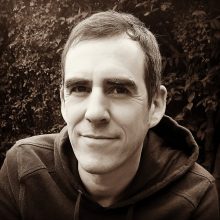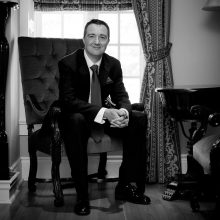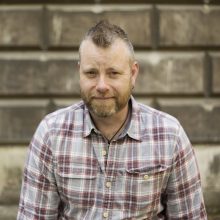Emerald City by Brian Birnbaum
What led you into writing?
In a word: failure. As a kid I was the best player on both my basketball and baseball teams. But by the time I entered high school, crippling anxiety smothered my ability to play as I knew I could. Not being able to understand and therefore fix the problem sparked deep anger and sadness, which I now realize was loss. This failure, I believe, shaped my life in ways more significant than I’d want to admit, and was the inspiration for Benison Behrenreich, one of my three protagonists, who struggles with a lot of things I did, including sports anxiety.
I started writing consistently at 21, but it’s not like I approached the page with the formal intent to address this failure. In fact it was quite the opposite. My first few years of writing were burdened by a refusal or inability to reckon with what had opened me up to art, and I missed the possibilities within vulnerability and emotion that harmonizes with beautiful or impressive language. I spent a long time trying to prove how smart and funny I was (or was not) before slowly gravitating toward the things that really scare and hurt me. Still, in some paradoxical manner, the very things that scared and hurt me — along with the things I didn’t know or couldn’t quite understand — were those which led me to writing, if in a bit of a roundabout manner.
How does a typical day look?
I’m a night owl, so, generally, I wake up around 11:00 and get straight to work, galvanized by some form of stimulant and the guilt that most people have been awake for hours. I work from home for the family sign language interpreting business (my parents are Deaf), which allows my flexible schedule. However, I’m also a co-founder of Dead Rabbits Books, with which my novel is being published on September 15th, 2019. So, during breaks at my day job, I’ll write a little here, do a little reading there, but it isn’t until I get off work that I’m really able to focus on the passion project.
At night, I’m lucky to have a moment of respite. I live with M.K. Rainey, my partner in all senses of the word, and chances are we’ve got a Dead Rabbits Reading Series event or a Dead Rabbits podcast scheduled for that night. Both of which have been going extremely well. The reading series just celebrated a fifth birthday, and the podcast has really begun to hit its stride, particularly after we put out our eighth episode, featuring PEN America’s Prison Writing Director, Caits Meissner, and the maximalist writer of our time, Sergio De La Pava, whose first book, A Naked Singularity, was self-published with incredible success, leading to his third novel’s publication with Pantheon Books. Each episode is different, ranging from hilarious and absurd to whip-smart and focused, but they’re all valuable in their own right.
There really isn’t enough time in the day. I’m perpetually sleep-deprived. But I love what I’m doing, and wouldn’t trade it in for anything.
In what ways do your characters test your abilities?
They test my ability to be honest and vulnerable. Even with the veil of fiction, even transfigured through the eyes of my characters, it’s difficult to write about that which truly scares you or hurts you. If it were easy to do that, it would be easy to be honest with ourselves, yet this requires far more courage than many of us will ever so much as realize.
Another chapter written early in the process is the second chapter, in which the reader learns about how Benison’s anxiety infects each aspect of his life. I wrote a draft of this chapter in an eight-hour marathon session while house-sitting for my mom’s friend on the Upper East Side. For some reason, the espresso was really working that day; for the first time, I lay myself bare through Benison’s narrative, not merely explaining in abstract terms what it was like to fail at that which you loved most, but showing it through memories transfigured into scenes — memories of shame and failure and embarrassment.
From then on, it’s been a matter of capturing that vulnerability through my loyalty to literary prose.
What’s your setup?

Truthfully, I spend more time working/writing on the couch, but it’s way cooler to take a picture of me in the big boy chair and the podcast stuff set up.
What lasting effects have your favourite authors had on your writing and style?
I have a complicated relationship with the first writers I fell in love with. What David Foster Wallace, David Mitchell, Anne Carson, and Virginia Woolf all have in common is impressiveness. While their writing spoke to me on an intimate level, their intellect spoke to my quixotic ego, which was adamant that I’d emulate Zadie Smith by emerging into a literary rock star in my early 20s.
So while my literary heroes did speak to my fears and vulnerabilities more than any other, they also inadvertently inspired me to try and come off as the smartest, funniest writer in the room. After reading Infinite Jest, I spent a year doing my best Wallace impression. Looking back, it’s understandable; his writing elevated literary possibility toward dimensions heretofore unfathomed. Furthermore, stretching my prose in an attempt to imitate DFW was like training for an Ironman race; I might never be able to win one, but I damn well made a sprint triathlon seem like a proverbial walk in the park.
I’d never be the writer I am today without my heroes mentioned supra — in fact, I’m not sure I’d have stuck with writing had I failed to find these kindred spirits — but their impact on my perspective on writing threatened to derail me precisely because of how they took hold of me.
What do you do for inspiration?
Change my state of consciousness. Whether it’s my morning cup of coffee, meditation, exercise, a good book, or something more directly psychoactive, it’s imperative to my process and my quest for innovation that I approach the page with a shifted mindset.
The fictional technology has had an overwhelming impact on humanity. Fiction created societies, their laws, their markets, their origin myths. In this sense, much of fiction’s purpose has been geared toward the consolidation of power. Literary fiction, however, is one of the few genres aimed at elevating our conscious. My inspiration comes from advancing literary fiction, which inherently requires a change in my state of consciousness, else we mire in spiritual stagnation, carried thoughtlessly along the currents of history by the ambitious and power-hungry.
What repeating themes do you find yourself pulling into your stories?
In no particular order: failure, futility, drugs, addiction, organized crime, corporate fraud, finance, interpersonal and romantic ambivalence, questions of free will, Deafness, and sports.
How do you wind down?
Generally speaking, I don’t. Hence the sleep troubles. However, my attempts are steeped in a stiff drink, Netflix, the newspaper, the gym, group therapy, and meditation. The latter is a new pursuit, and I am absolutely shocked by how difficult it can be. As for therapy, most might consider it utterly antithetical to the notion of winding down, but I feel far more at peace when addressing my issues head-on. The effect is cathartic.
What sort of challenges do you regularly overcome while world-building?
As a writer of literary surrealism, world-building is a little more subtle as compared to other genres. That is, I’m not creating entire eleven languages or extraplanetary civilizations. However, my novel does have drones delivering groceries in the year 2012, which requires trust that the reader will reconcile this anachronism with the tone and style of my novel.
For example, one of the biggest challenges was writing about Peter, another of my three protagonists, running marijuana across the Canadian border on his motorcycle. The idea of a marijuana mule bucking and turning his bike through mountainous pine trails is all but patently absurd — if I was writing realism. Building authenticity around this narrative required not only emphasizing his virtuosity on a bike, but other surrealist details such as border patrol’s increased efficiency in catching mules on foot and the attendant need to radically alter the way distributors moved their product across the border.
What’s the most useful advice you could give to an aspiring author?
What you omit is as important as what you include. The reader takes a sentence, a paragraph, a chapter, and uses their imagination to extrapolate what’s being told unto an entire universe. One faulty detail, one out-of-place piece of dialogue, and you threaten to tear a hole in the projection screen.
Tell us about the book you’re promoting.
I got the idea for Emerald City after hearing my father talk about Viable Communications, a company owned by a former classmate of my father’s at Gallaudet University. Through Video Relay Service (VRS) for the Deaf, which is subsidized by the government, Viable defrauded the FCC out of tens of millions of dollars.
I also knew I wanted to write about the sports anxiety I’d experienced as a teenager. Thus, a father-son dynamic was born: Benison Behrenreich, the college basketball player and child of Deaf adults; and his father, Marc, the unscrupulous CEO of Behrenreich Interpreting Services who, along with syndicate bosses, develop a multimillion-dollar VRS fraud scheme.
Set in Seattle, Emerald City follows Benison Behrenreich just after his father, Marc, has bribed Myriadal College officials for Benison’s spot on their powerhouse basketball team, where he struggles to prove himself and compensate for his father’s sins.
Meanwhile, years after Julia Paolantonio learned her father was an addict, she loses her father to an embolism resulting from a failed IV attempt. His death is the culmination of a years-long revelation that her granola-crunchy San Franciscan family is all but a front for the truth of her heritage. In the months leading up to her freshman year at Myriadal, Julia’s mother ships her off to live with her estranged granddad, Johnny Raciti. Johnny offers her a deal: bring him Peter Fosch – tormented college dropout and the best drug runner west of the Cascades – and he’ll give Julia’s freshly widowed mother a board seat on his mobbed-up securities firm.
When Benison’s father is arrested for defrauding government subsidies for the deaf, the Behrenreichs are left vulnerable to his company’s ruthless backers – namely Johnny Raciti – forcing Julia and Peter to navigate the minefield left in the aftermath.
👋 Hi! I run Author Interviews
As a new writer I found myself itching to contribute to a thriving, creative community, so I made Author Interviews and I've met loads of wonderful people in the process. You can buy my debut fantasy RINGLANDER: THE PATH AND THE WAY from Amazon.
